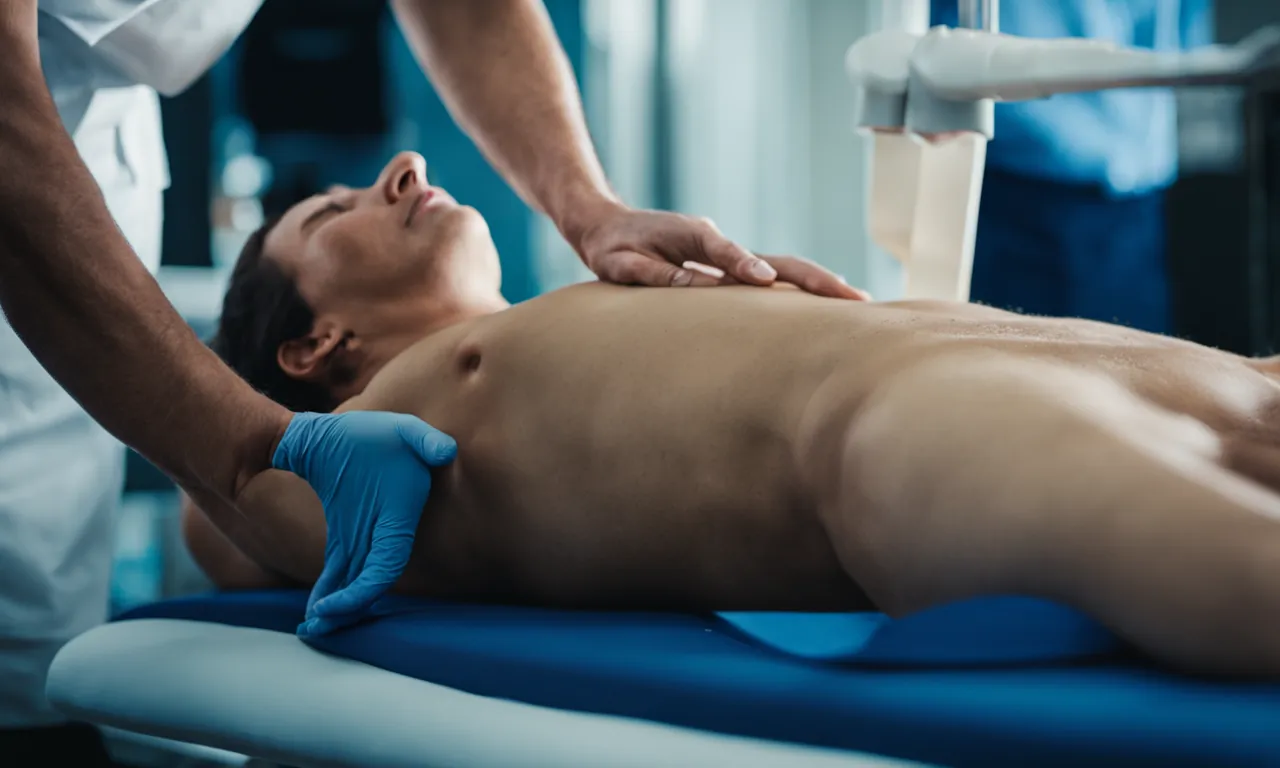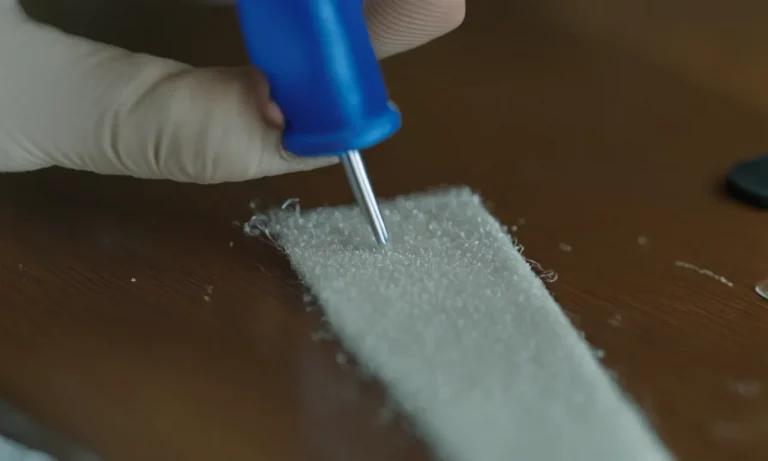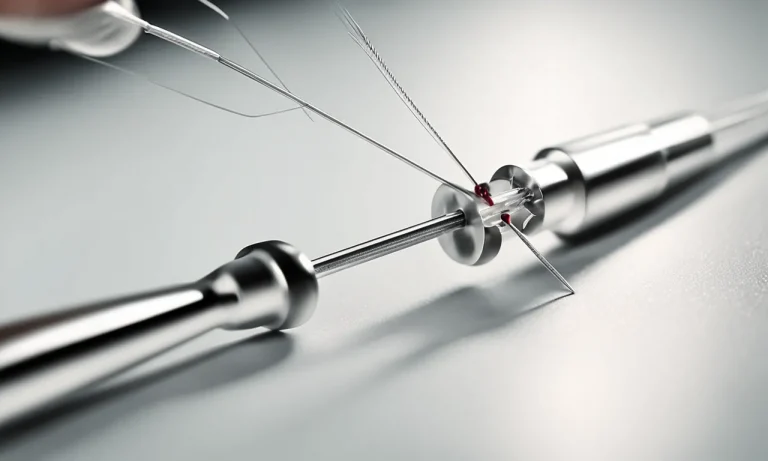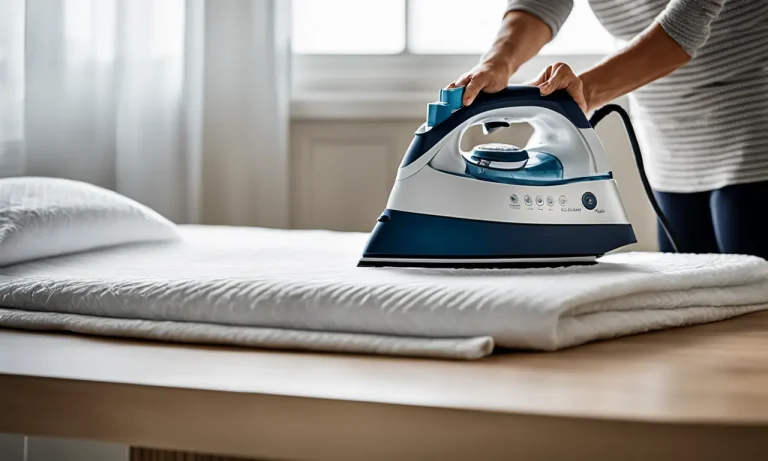Needle Pricking Pain In Lower Abdomen: Causes And Treatments
If you have ever felt a sharp, needle-like pain in your lower abdomen, you know how uncomfortable and concerning it can be. A stabbing sensation in the lower belly is often the sign of a minor, treatable issue, though in some cases it can indicate a more serious problem.
In this comprehensive guide, we will explore all of the possible causes of needle-like pains in the lower abdomen and provide an overview of the available treatment options. Read on to get a better understanding of what might be causing your symptoms and how to find relief.
What Causes Needle Pricking Pain in the Lower Abdomen?
Experiencing a needle pricking pain in the lower abdomen can be uncomfortable and concerning. There are several potential causes for this type of pain, ranging from menstrual cramps to more serious conditions such as appendicitis.
Understanding the possible causes can help you identify the underlying issue and seek appropriate treatment.
Menstrual Cramps
One common cause of needle pricking pain in the lower abdomen is menstrual cramps. These cramps occur due to the contraction of the uterine muscles during menstruation. The pain is typically felt in the lower abdomen and may be accompanied by other symptoms such as backache, headache, and fatigue.
Over-the-counter pain relievers and heating pads can provide relief for many women experiencing menstrual cramps.
Round Ligament Pain
Pregnant women may experience needle pricking pain in the lower abdomen due to round ligament pain. The round ligaments support the uterus and can stretch and strain as the baby grows. This can result in sharp, stabbing pain in the lower abdomen, particularly when changing positions.
Resting, applying heat, and gentle stretching exercises can help alleviate this discomfort.
Urinary Tract Infection
A urinary tract infection (UTI) can cause needle pricking pain in the lower abdomen. UTIs occur when bacteria enter the urinary tract and cause inflammation. In addition to abdominal pain, symptoms may include frequent urination, burning sensation during urination, and cloudy or strong-smelling urine.
UTIs require medical treatment with antibiotics to clear the infection.
Kidney Stones
Kidney stones can cause severe needle pricking pain in the lower abdomen. These small, hard mineral deposits can develop in the kidneys and may move into the urinary tract, causing pain and discomfort.
Other symptoms of kidney stones may include blood in the urine, frequent urination, and a persistent urge to urinate. Treatment for kidney stones may involve pain management, hydration, and, in some cases, surgical intervention.
Appendicitis
Appendicitis is a serious condition that can cause intense pain in the lower abdomen. The appendix becomes inflamed and may require surgical removal to prevent complications. In addition to needle pricking pain, other symptoms of appendicitis may include fever, nausea, vomiting, and loss of appetite.
If you suspect appendicitis, it is crucial to seek immediate medical attention.
Endometriosis
Endometriosis is a condition in which the tissue that normally lines the uterus grows outside of it. This can lead to needle pricking pain in the lower abdomen, particularly during menstruation. Other symptoms may include heavy or irregular periods, pain during intercourse, and infertility.
Treatment for endometriosis may involve pain management, hormone therapy, or surgical intervention.
Pelvic Inflammatory Disease
Pelvic inflammatory disease (PID) is an infection of the female reproductive organs. It can cause needle pricking pain in the lower abdomen along with other symptoms such as abnormal vaginal discharge, fever, and pain during intercourse.
PID requires prompt medical treatment with antibiotics to prevent further complications.
Irritable Bowel Syndrome
Irritable bowel syndrome (IBS) is a chronic condition that affects the large intestine. It can cause abdominal pain, bloating, and changes in bowel habits. Some individuals with IBS may experience needle pricking pain in the lower abdomen.
Managing IBS often involves dietary changes, stress management techniques, and medication as prescribed by a healthcare professional.
Hernias
Hernias occur when an organ or tissue pushes through a weak spot in the surrounding muscle or connective tissue. Depending on the location, a hernia can cause needle pricking pain in the lower abdomen.
Other symptoms may include a bulge or lump in the affected area, discomfort or pain during physical activity, and constipation. Treatment for hernias may involve watchful waiting, lifestyle changes, or surgical repair.
If you are experiencing needle pricking pain in the lower abdomen, it is important to consult with a healthcare professional for an accurate diagnosis and appropriate treatment. They can evaluate your symptoms, perform necessary tests, and recommend the best course of action to alleviate your discomfort.
When to See a Doctor for Needle Pricking Pain
Severe, persistent pain
If you are experiencing needle pricking pain in your lower abdomen that is severe and persistent, it is important to see a doctor. This could be a sign of a more serious underlying condition that requires immediate medical attention.
Ignoring this type of pain could potentially lead to further complications, so it is best to seek professional medical advice.
Pain accompanied by fever or vomiting
If your needle pricking pain in the lower abdomen is accompanied by fever or vomiting, it is crucial to consult a doctor. This combination of symptoms could indicate an infection or inflammation in the abdominal area.
Prompt medical attention is necessary to determine the cause and initiate appropriate treatment.
Pain with abnormal discharge
If you are experiencing needle pricking pain in the lower abdomen along with abnormal vaginal or penile discharge, it is important to seek medical evaluation. This may be a sign of a sexually transmitted infection or another underlying condition that requires medical intervention.
A healthcare professional can provide the necessary diagnosis and treatment options.
Pain with inability to urinate
If the needle pricking pain in your lower abdomen is accompanied by difficulty or inability to urinate, it is crucial to see a doctor. This could be a sign of a urinary tract infection, kidney stones, or another urinary condition that requires medical attention.
Prompt treatment can help alleviate symptoms and prevent further complications.
Pain with bloody stool or urine
If you are experiencing needle pricking pain in the lower abdomen along with bloody stool or urine, it is essential to seek immediate medical attention. This could be a sign of a gastrointestinal or urinary tract issue, such as kidney stones or gastrointestinal bleeding.
A healthcare professional can evaluate your symptoms and provide appropriate treatment options.
Diagnosing the Underlying Cause
Experiencing needle pricking pain in the lower abdomen can be distressing and it is important to diagnose the underlying cause in order to provide appropriate treatment. Several diagnostic methods can help identify the source of the pain:
Physical exam
A physical examination is usually the first step in diagnosing the cause of lower abdominal pain. The healthcare provider will carefully examine the abdomen, looking for any signs of tenderness or abnormalities.
They may also ask questions about the pain, such as its location, intensity, and duration, to gather more information.
Pelvic exam
A pelvic exam may be conducted to examine the reproductive organs and check for any abnormalities. This can help identify conditions such as ovarian cysts, fibroids, or infections that may be causing the needle pricking pain.
Blood tests
Blood tests can provide valuable information about the overall health of an individual and help identify any underlying conditions that may be causing the pain. These tests can measure hormone levels, check for signs of infection or inflammation, and assess organ function.
Urinalysis
A urinalysis can help determine if a urinary tract infection (UTI) is causing the pain. By analyzing a urine sample, healthcare providers can detect the presence of bacteria, blood, or other abnormalities that may indicate an infection.
Ultrasound
An ultrasound uses sound waves to create images of the organs and structures in the abdomen. This non-invasive procedure can help identify conditions such as kidney stones, ovarian cysts, or uterine fibroids that may be responsible for the pain.
CT scan
In some cases, a CT scan may be recommended to get a detailed view of the abdomen and identify any potential causes of the pain. This imaging test combines X-rays and computer technology to create cross-sectional images of the body.
It is important to note that the diagnostic methods used may vary depending on the individual’s symptoms, medical history, and the healthcare provider’s clinical judgment. Additionally, additional tests or consultations with specialists may be necessary in some cases to accurately diagnose the underlying cause of the needle pricking pain in the lower abdomen.
Treatment Options for Needle Pricking Pain
OTC pain medications
Over-the-counter (OTC) pain medications can provide relief for needle pricking pain in the lower abdomen. Nonsteroidal anti-inflammatory drugs (NSAIDs) such as ibuprofen or acetaminophen can help reduce inflammation and alleviate pain.
These medications are easily accessible and can be purchased without a prescription. However, it is important to follow the recommended dosage and consult with a healthcare professional if the pain persists or worsens.
Heating pads
Applying a heating pad to the lower abdomen can help relieve needle pricking pain. The heat promotes blood flow, relaxes muscles, and reduces discomfort. Simply place a heating pad on the affected area for 15-20 minutes at a time, making sure to use a low or medium heat setting to avoid burning the skin.
This method can be used in conjunction with pain medications for additional relief.
Antibiotics
If the needle pricking pain in the lower abdomen is caused by an infection, antibiotics may be prescribed. Infections such as urinary tract infections or pelvic inflammatory disease can cause these symptoms. Antibiotics are used to treat the underlying infection and alleviate the pain.
It is important to complete the full course of antibiotics as prescribed by a healthcare professional to ensure the infection is fully eradicated.
Surgery
In some cases, surgical intervention may be necessary to treat the underlying cause of needle pricking pain in the lower abdomen. This could be due to conditions such as appendicitis, ovarian cysts, or endometriosis. Surgery aims to remove the source of the pain and restore normal function.
It is important to consult with a healthcare professional to determine if surgery is the appropriate treatment option.
Lifestyle changes and home remedies
In addition to medical interventions, certain lifestyle changes and home remedies can help manage needle pricking pain. These include maintaining a healthy diet, staying hydrated, practicing stress management techniques, and engaging in regular exercise.
Avoiding triggers such as spicy foods, caffeine, and alcohol can also help reduce discomfort. Additionally, applying a warm compress or taking a warm bath may provide temporary relief.
It is important to note that the treatment options for needle pricking pain in the lower abdomen may vary depending on the underlying cause. It is always recommended to consult with a healthcare professional for an accurate diagnosis and appropriate treatment plan.
Conclusion
In summary, needle-like pain in your lower abdomen can stem from a number of causes, ranging from mild menstrual issues to potentially serious conditions like appendicitis. Pay attention to any accompanying symptoms and see your doctor promptly if the pain becomes severe or persists.
With an accurate diagnosis, most causes of stabbing lower abdominal discomfort can be effectively treated. Simple home remedies like heat pads can provide relief in many cases. If needed, prescription medications, surgical procedures, and lifestyle changes can also help eliminate ongoing pain.







